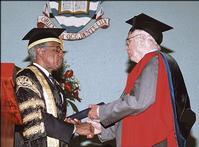Howard Campbell, Gleaner Writer

Richard Hart receiving an honorary degree from Sir George Alleyne, chancellor of the University of the West Indies, at the graduation ceremony at Mona on November 5, 2005. - PHOTO BY NATHANIEL STEWART
RICHARD HART, a founding member of the People's National Party (PNP) and one of the pioneers of Marxism in Jamaica, will be the focus of a three-day conference this week at the University of the West Indies (UWI), Mona.
'Politics, Activism and History: The Life and Times of Richard Hart' opens Thursday with a library exhibition and launch of books by Hart, and B.F. Bankie and K. Mchombu.
Professor Rupert Lewis, a lecturer in the Department of Government at the UWI, says academics from the Caribbean, Australia, the United Kingdom and the United States will examine Hart's legacy as politician, historian and journalist in a series of panel discussions.
"He was involved in Jamaican politics at a time when there was no tribalism, and was a Marxist and never hid it," said Professor Lewis. "He has a Caribbeanwide record and we are very fortunate that he's still around to share his knowledge with us."
WRITER
Mr. Hart, 78, now lives in London. Last November, he received the Musgrave Gold Medal from the Institute of Jamaica for his work as an historian; that month he was also given an honorary degree from the UWI.
Mr. Hart has written extensively on slavery, the trade union movement and political issues. He was one of the founding members of the PNP in 1938, and is probably best known as one of the Four Hs (the others being Frank and Ken Hill and Arthur Henry) who were dismissed by the party in 1952, reportedly for their communist views.
After his expulsion from the PNP, Mr. Hart formed the People's Freedom Movement (later the Socialist Party of Jamaica) in 1954. That party folded in 1962.
He was editor of The Mirror newspaper in Guyana for a short time during the mid-1960s, and was an adviser to Grenadian Prime Minister Maurice Bishop, at the time of the United States invasion of that country in 1983.
REFLECTION FROM PROFESSORS
Professor Lewis is one of several UWI lecturers who will reflect on Mr. Hart's contribution to Jamaican and Caribbean politics. Others include Robert Buddan of the Department of Government; Mark Figueroa of the Department of Social Sciences; and Cecil Gutzmore of the Institute of Caribbean Studies.
From overseas, there will be Obika Gray (University of Wisconsin-Eau-Claire); Cleveland Da Costa (City University of New York); and Anne Hickling-Hudson, from the Faculty of Education at the Queensland University of Technology in Australia.
Professor Lewis says orga-nisers of the conference have made an effort to reach out to persons who may not be aware of Mr. Hart's work.
"We are definitely hoping to attract students. It's being held at the end of the semester when there are not a lot of them around but we are hoping to see a lot of young people," he said.
Richard Hart Conference (select discussions)
THURSDAY, JUNE 8
Library exhibition - The Life and Times of Richard Hart
Launch of Pan-Africanism: 'Strengthening the Unity of Africa and its Diaspora' by B.F. Bankie and K. Mchombu and The End of Empire: 'Transition to Independence in Jamaica and Other Caribbean Region States' by Richard Hart (5:30 p.m.-8:00 p.m.)
FRIDAY, JUNE 9
1938 and its Legacies (10:15 a.m.-12:00 p.m.) Chaired by Professor Hubert Devonish.
Hart and the Caribbean Economic and Labour History
Chaired by Professor Anthony Bogues (2:00 p.m.-3:30 p.m.)
SATURDAY, JUNE 10
Revisiting the Grenada Revolution Chaired by Professor Brian Meeks (9:00 a.m.-10:30 a.m.)
Critiquing the Caribbean Left Chaired by Professor Anthony Harriott (10:45 a.m.-12:15 p.m.)
Jamaican Politics: Has the Promise of Adult Suffrage Been Fulfilled?
Chaired by Professor Rex Nettleford
Panellists: Arnold Bertram, John Maxwell, Anthony Johnson, Carol Narcisse and Paul Burke (4:15 p.m.-5:45 p.m.).

